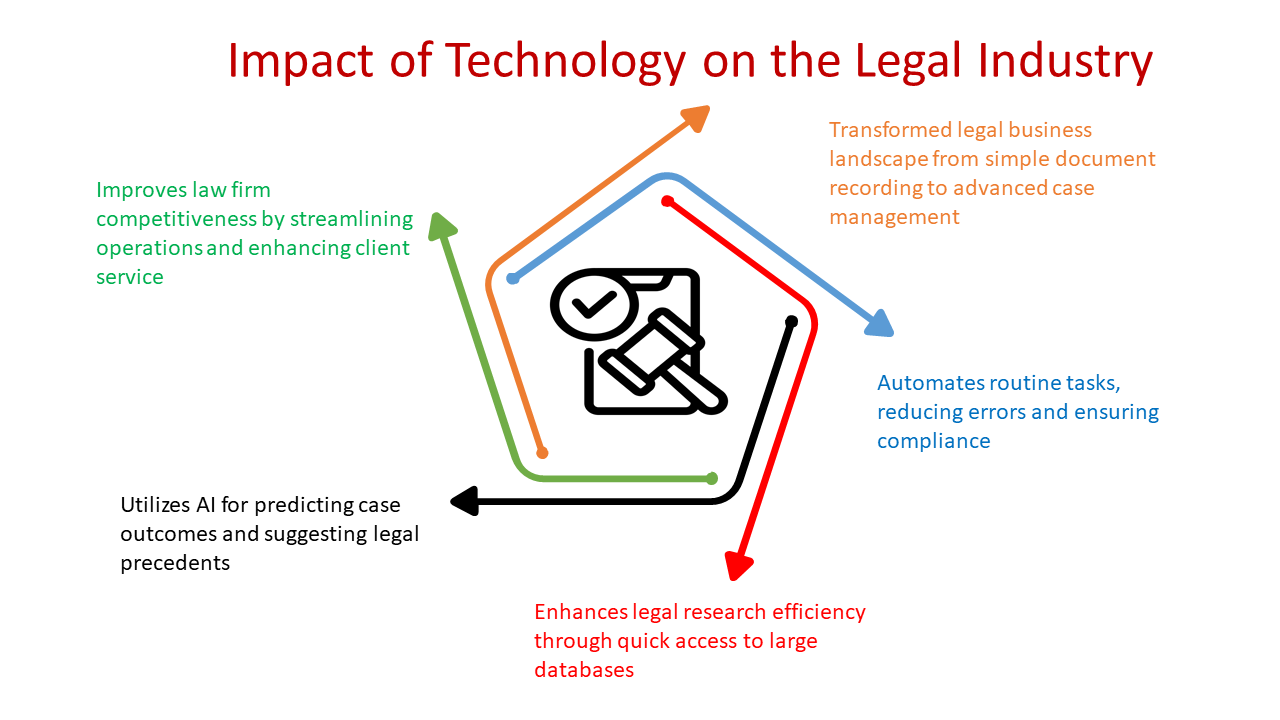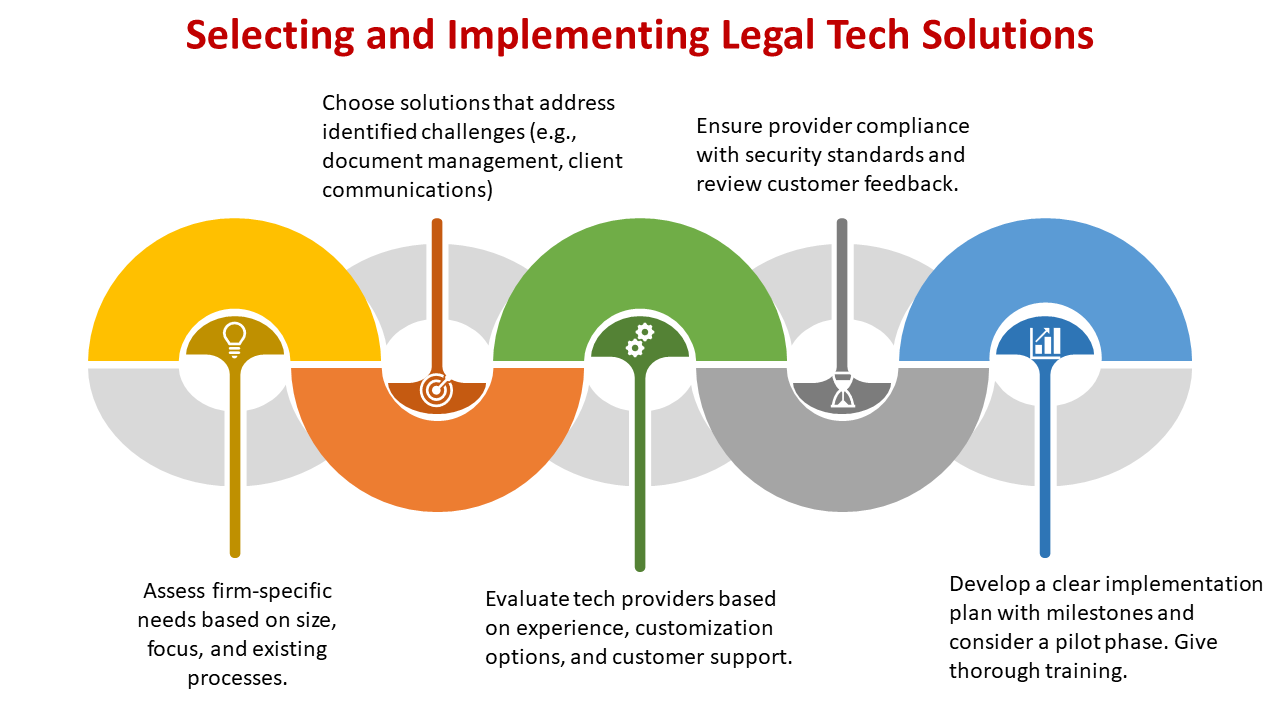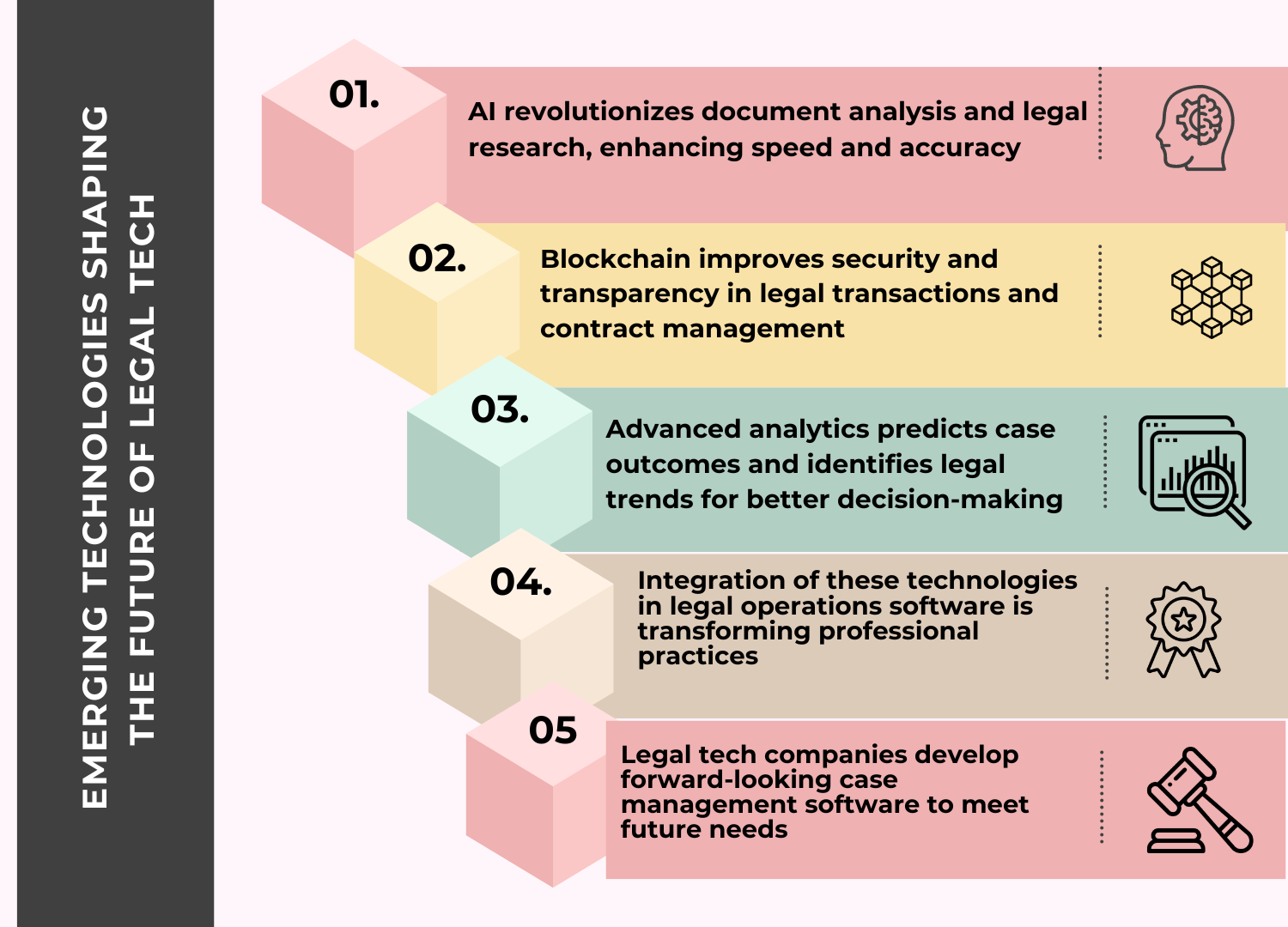Table of Contents
Legal tech has fundamentally transformed our legal business landscape. In the last 10 years, there has been a lot of development in this field; it started from simple automatic document recording to advanced-level case management systems. When we look at legal technology development, legal software development is paving the way and transforming mundane practices into a more effective course. Any Legal tech company uses digital tools and solutions to empower the unique requirements of law firms and legal departments. A legal case management software solution cuts the everyday administrative operations that take up a majority of the time for an attorney and offers them much more time on the more important areas of their work. According to recent research, the global market size of legal tech is expected to grow from $23.45 billion in 2022 to a CAGR of 9.1% from 2023 to 2030. This indicates a rapidly growing usage and investment in this.

Technology Has Ensured That Legal Professionals Save Time And Work Efficiently
Every minute saved is crucial for cost efficiency and client satisfaction. Technology plays a key role here. With tech solutions from legal tech companies, professionals can automate routine tasks like scheduling, tracking time, and filing documents. Automating these tasks reduces errors, ensures compliance, and maintains accuracy in all legal documents.
Moreover, specific technologies, like legal software development, enable lawyers to access large legal precedents and regulations databases quickly. This reduces the time spent on legal research, freeing lawyers to focus more on analyzing cases and building strong arguments.
Using artificial intelligence (AI) in legal tech tools is one example of technology boosting efficiency. AI can predict case outcomes, suggest legal precedents, and propose updates to legal documents according to current laws. These tools not only save time but also improve the strategic abilities of legal professionals.
In the end, technology entering the legal industry is far more than a fad; it means law professionals no longer have to isolate efficiency from those high-priority tasks they perform on a daily basis. A Legal tech company helps law firms streamline their operations and serve their clientele faster and better than before – this boosts the competitive clout of a firm on the market. With the rise of technology, the importance of technological innovation in legal practice is set to continue shaping how legal work is completed and giving way to a future where legal services can be delivered more effectively, efficiently, and in line with client demand.
What is Legal Tech?
Legal tech uses technology and software to help lawyers and law firms work. It includes everything from simple tools that manage documents to complex systems that use artificial intelligence to help make legal decisions. Legal tech makes legal work faster, cheaper, and more efficient.
The Significance of Legal Tech in Modern Law Firms
In today’s rapidly evolving legal landscape, the integration of technology is no longer optional but essential for law firms aiming to stay competitive. A legal tech company provides innovative solutions that streamline various legal processes, enhancing efficiency and productivity.
One of the pivotal innovations in this field is legal case management software development. These sophisticated software types allow firms to track their case deadlines and communicate regularly with the client. When all details regarding a case are centralized, it reduces the risk of mistakes and ensures that attorneys can promptly access vital information they need to deliver high-quality services.
Another critical component is Law Firm IT Solutions. These solutions encompass a broad range of tools, from secure document management systems to sophisticated electronic discovery platforms. These technologies are designed to handle the complexities of legal work, providing robust support for everything from document drafting to case analysis.
The adoption of these technologies brings numerous benefits to law firms. They not only save time by automating routine tasks but also reduce operational costs, making legal services more affordable and accessible. Furthermore, they enhance the overall client experience by providing faster, more accurate service.
Get Started With Legal Automation Today and Boost Your Productivity
Key Innovations in Legal Tech
Document Automation: Making Paperwork Easier
In legal work, paperwork is necessary but takes a lot of time. Document automation is a key breakthrough. It reduces the need for manual document work. This tech lets legal pros make standard documents like contracts and wills quickly.
A company that specializes in legal tech provides software with easy-to-use templates that can be adjusted to fit different needs. The benefits include fewer mistakes, quicker document handling, and smoother workflows. This lets lawyers focus on tougher parts of their cases and boosts document quality and consistency.
Legal Research Tools: Quicker Case Prep
Legal research is crucial for building a case and backing arguments with the right laws and precedents. It used to take a lot of time, but legal research tools have changed this completely.
Modern legal tech company offer tools that allow fast access to a large library of legal resources. These tools can quickly find relevant laws, cases, and articles. Some can even guess which legal precedents fit best with certain case details. This cuts down on prep time and helps lawyers understand the laws better, making them more effective.
Case Management Systems: Easier Case Handling
Case management systems are vital for law firms. They put many parts of managing a legal practice into one easy-to-use platform. This helps manage cases, talk to clients, keep schedules, and handle billing.
Legal practice management software development aims to be easy for all legal staff to use. It often works well with other tools like emails and calendars. This makes for a smooth workflow. Automating regular tasks, like scheduling and reminders, boosts efficiency. It keeps everything on track and clients informed.
These systems lighten legal teams’ workloads, reduce mistakes, and improve the firm’s responsiveness. Better organization and efficiency improve work output and make clients happier and more trusting.
Benefits of Legal Tech for Law Firms
Increased Efficiency: How Legal Tech Speeds Up Routine Tasks
A major benefit legal tech brings to law firms is greatly improved efficiency. Legal tech firms develop tools and software to automate routine tasks that usually take time and manual effort. This includes making documents, billing clients, and managing case files.
For example, legal management software solutions should be able to automatically schedule appointments, track billable hours, and set reminders for important deadlines. Lawyers and their teams can now spend less time on paperwork, keying in data, and more time on the front lines while also enabling them to have intelligent discussions.
Accuracy and Compliance: Minimizing Errors and Staying Compliant
One of the other key advantages of using technology from a legal tech company is that it ensures accuracy and compliance. Not only do legal tech tools help streamline processes, thereby saving time and money, but they can also save thousands (if not millions) of dollars on costly legal mistakes that are much easier to prevent than remedy. These tools, which auto-manage the document, provide companies with a way of complying with stringent legal rules since all filings will be correct per the latest legal standards.
A Legal tech company serving as an intermediary between lawyers and their clients can create compliance checks that computer software will proactively execute when users complete documents. This proactive initiative helps avoid errors that might end up costing law firms dearly and being accused of being less than meticulous. Furthermore, some legal tech systems also have the feature to self-update with new legal changes and self-adjust their compliance settings to make it easier for firms to pass compliance checks without manually tracking every minor law change.
Edge You Need to Remain Competent with Upcoming Tech Solutions
Legal tech is a huge edge in the competitive legal market. Advanced legal tech solutions empower firms to provide services that are not only frictionless but also client-centric. Legal tech has advanced capabilities of data management and analytics, which can help us find out the client behavior, case outcome, and how your firm is operation all together. As the law firms get better insights that enable them to maintain improvement in their strategies and service offerings.
In addition, companies that utilize cutting-edge technology, including AI for predictive analytics, forecast case results more accurately (a significant selling point when it comes to winning new clients). In addition, legal tech allows clients to stay more connected with their cases, outlining a Client Portal that can give customers the status of their cases and allow direct interaction with the lawyers. Client’s trust in the price and your seriousness; usually, this can hold any job!

The Rise of Legal Tech Companies
The legal tech market has seen impressive growth recently, driven by a rising demand for more efficient legal services. This growth is largely due to the increased use of technology across various sectors, which has pushed legal practices to change and adapt. Legal tech companies are leading this change, offering new solutions that tackle many operational challenges faced by law firms and legal departments. A report published by McKinsey states that approximately 23% of work done by lawyers can be automated by existing technology. Obviously, the effects of automation could be way more disruptive considering the speed with which certain tools are developing (eg.AI and NLP)
The market’s expansion is clear from the growing investments in legal tech startups, which have received substantial funding to create new products and expand their operations.
Contact a reputable legal tech company now and find the best solutions for your firm with A3Logics.
Choosing the Right Legal Tech Solutions
Needs Assessment: What Your Firm Needs Most
Choosing the correct legal technology solution begins when you know what your law firm or legal department needs to streamline its processes. Each firm is different, with individual requirements about size, niche focus, client demographics, and overall nature of how it does business. First, evaluate where technology can relieve your current processes.
If, for instance, your organization suffers from an ungainly document-management process due to the number of cases you handle, look for a solution that features robust document automation and organization capabilities. On the other hand, if you are frustrated with navigating through client communications and scheduling, CRM-integrated legal management software may solve your problem. The idea is to recognize the problems that your firm has and to implement legal tech solutions that tackle each of these challenges.
How to Evaluate Legal Tech Providers – What You Need in a Tech Partner
Identify your needs and start with potential legal tech providers next. Partnering with a provider is important as providers will not only provide the technology but also help in its integration and use.
The best legal software development company will have a proven history of implementing with law firms or in legal department settings like your own. Seek offers from providers that provide customization tools that address your unique needs. Additionally, examine how their customer support is because you will require assistance before and after the software installation. Security is also crucial: ensure that the provider complies with all security standards and always provides your sensitive information.
The reviews given by the customer are helpful in this context as well. Provide a look into the actual reliability of the software, how responsive its provider is, and the true pros and cons users have experienced.
Execution: How To Successfully Implement New Technology
Bringing new technology in-house is about much more than simply buying and setting up software. It also relates to how you embed it within the organization, that it gets to work in existing workflows, and that staff have the skills they need to use it effectively.
Start with a clear implementation plan that includes key milestones and timelines. Consider a pilot phase, first testing the new technology with a small group. This allows you to gather feedback and make adjustments before fully rolling it out.
Training is crucial. Ensure all users receive thorough training tailored to their roles. Ongoing support from the legal tech company is also important to resolve any issues and ensure a smooth transition.
Monitor the technology’s use and impact regularly. This helps determine whether it’s meeting your goals and what improvements or additional features might be needed. User feedback can guide future tech decisions and help build a culture of continuous improvement.
Selecting and deploying a legal management software development is a strategic decision that has far-reaching implications for the efficiency as well as effectiveness of a law firm. Firms can better make the most of their tech investments by carefully assessing needs, weighing potential tech partners, and adhering to implementation best practices. The key to getting the most out of these tools, thereby increasing the quality of services and improving client satisfaction, is understanding that (i) legal tech keeps changing and keeping oneself informed and (ii) developing an ability to adapt.
Traditional Law Practice and Legal Tech- The Future
What Are Some Examples Of Legal Tech Changing The Way We Practice Law
They help the firm to define itself as a legal tech. This is already changing, as legal tech companies produce legal software solutions that streamline (and in many cases automate) them. This is not merely a change in replacing old tools with new ones; it is rather a fundamental shift in how legal work is done.
These innovations have changed case management, such as legal practice management software solutions. These systems allow the attorney to process case files more efficiently and quickly, reducing time on administrative tasks and giving the client more attention. They also mix billing, time tracking, and client communication, resulting in increased productivity and reduced expenses.
With the advent of document automation tools, the creation of standard legal documents has become a much quicker and easier process, from hours to mere minutes. This lowers errors, increases velocity, and ensures the legal integrity of documents.
This enables lawyers to receive help predicting outcomes much more accurately using artificial intelligence and machine learning techniques in predictive analytics. These technologies also use old court decisions and legal rules that allow us to say things we could not a decade or two ago.
Resistance and Adaptation: The Dual Response from the Legal Community
The response to legal tech varies. Some lawyers see it as a way to serve clients better and improve satisfaction. Others resist, worried about its impact on traditional practices.
Resistance often comes from fear of change, concerns about job security, and a reluctance to abandon familiar practices. Many experienced lawyers prefer traditional methods and see new technologies as disruptive.
Still, with the benefits of legal tech becoming increasingly clear, more legal professionals are starting to use it under pressure to remain competitive. Firms that embrace these technologies are seen as innovative and more attractive for an increasingly tech-savvy new client base.
Adapting involves major changes in how firms operate and think. It requires investing in new tech, training staff to use it, and embracing innovation as a key part of practice.
Legal Tech and Client Relations
Today, keeping clients happy is very important in law. Any legal tech company understands this need and creates tools to make talking to clients easier and better. They build legal operations software development that helps lawyers communicate more clearly and quickly.
One important tool is the client portal, a legal case management software solution. These portals let clients see their case details whenever they want, which helps build trust. Clients can also check updates, look at documents, and talk to their lawyers easily. This makes clients feel connected and well-informed, increasing their satisfaction.
Additionally, there are automated tools that could assist law firms in providing timed updates and client follow-ups. Avoid confusion, and keep your clients informed about what is happening with their case. Frequent communication ensures that clients feel secure and confident in their law firm.
The Future of Legal Tech

Some Emerging Technologies and What Effect They May Have
Legal technology is shining in the future. Legal tech companies are making tools that can completely revolutionize the way legal services are delivered. At the heart of this change are critical technologies such as:
- Artificial Intelligence: AI is changing legal tasks such as document analysis and legal research. AI systems process information much faster than humans. This lets law firms quickly sort through many documents to find important information, speeding up their work and improving accuracy.
- Blockchain: This technology improves the security and transparency of legal transactions. It could transform how contracts and intellectual property rights are managed. This is done by using smart contracts that automatically handle agreements without needing people. This could reduce fraud and ensure that agreements are followed closely.
- Advanced Analytics: This involves using data tools to predict the outcomes of cases and understand legal trends. It helps law firms make smarter decisions, plan better, and give stronger advice based on solid data.
These technologies are making legal work more efficient, accurate, and secure. Legal tech companies are integrating these technologies into their legal operations software solutions, changing how legal professionals work.
Legal tech is set to redefine traditional legal practice. Also, legal tech companies are at the forefront of developing legal case management software that meets today’s needs and anticipates tomorrow’s needs. As these technologies evolve, the legal field can look forward to major efficiency, security, and client satisfaction improvements.
Conclusion
The future of law lies in technology. While another benefit of a legal tech company is that it delivers immediate value, still more importantly, it provides the basis for future sales and profits. For modern law firms, putting new tech to work keeps pace with the changing legal landscape & provides the services clients seek today.
You don’t need to change overnight to adopt legal tech. Work your way up with incremental, purposeful changes. A better platform to arrange case filings or a document automation product to automate repetitive tasks. It all comes down to choosing the right solutions for your firm!
This is where it gets tricky because, in a post-COVID world, transitioning the law firm means partnering with the right legal tech company. Search for professionals who have experience in Legal Software Development Services and a good command of the legal industry-specific hurdles. A strong tech partner will be there for the long haul. They would offer training and support to ensure that your firm is getting the greatest benefit from new tools.
Leverage the power of legal technology and begin to make your firm more efficient, accurate, and client-centric today.
FAQs
What is a Legal Tech Company?
A company that creates technology for the legal field, building software to automate tasks, manage cases, conduct research, and improve efficiency in law firms and legal departments.
How Can Legal Tech Save Time for Lawyers?
Automating administrative tasks, scheduling, billing, and using AI-powered research tools to search legal databases quickly.
What are some of the hazards with using Legal Tech in Law firms?
A data breach or client information exposure and an over-reliance on automation could potentially miss important facts.
Which Legal Tech Solution Should My Firm Choose?
Identify your firm’s needs, research options with good reviews and security features, choose scalable software and consider customer support quality.






